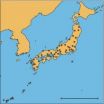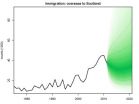(Press-News.org) New research1 presented at the European Society of Cardiology Congress in Barcelona shows that having a family history of cardiovascular disease (CVD) is not enough to motivate people to follow healthy lifestyles.
Researchers used data from 188,139 users of HeartAge.me, a free online tool that engages people presenting their personal CVD risk factors as their estimated 'heart age', to test the hypothesis that those who have a family history of CVD are more likely to attend medical examinations and blood pressure checks and be motivated to adopt healthy diet and lifestyle habits.
38.5% of users reported a family history of CVD in at least one parent, with 7% reporting a family history of CVD in two parents. Those who reported that a parent had suffered with CVD were more likely to know their blood pressure and cholesterol values than those without a family history of CVD, suggesting that they were more likely to get tested regularly.
However, this awareness of risk factors did not translate into lower CVD risk or healthier behaviours. Those who reported a family history of CVD had higher heart ages (5.8 years older than real age) than those who did not report family history (4.4 years older than real age). 25% of those who did not report family history of CVD scored 'poor' on a diet and lifestyle index, compared to 32% of users with family history of CVD in two parents.
Dr. Mark Cobain, Chief Science Officer at HeartAge who led the research commented "Our research challenges the idea that a family history of CVD may predispose individuals towards a healthier lifestyle. We see that even though people with family history of CVD are more likely to know their blood pressure and cholesterol numbers than those without, this alone does not appear to motivate them to adopt healthier habits. This could be because they believe that it is inevitable that they will develop CVD or doubt that it is preventable through risk factor control."
He added "Previous research2 indicates that making CVD risk personally relevant by giving an individual their heart age promotes behaviour changes and improved outcomes. Such a strategy may prove effective in communicating risk and motivating lifestyle change for those with a family history of CVD."
Separate research3 from the same team, which was also presented at the ESC Congress, highlighted the potential of small diet and lifestyle changes to reduce CVD risk, suggesting that these changes could have similar, or even greater effects than drugs such as statins or anti-hypertensives.
The modeling study looked at the impact of lifestyle changes including following a healthy diet, losing weight, increasing physical activity and giving up smoking on CVD risk expressed as a heart age. Key findings include:
For people with hypertension (high blood pressure), adherence to a healthy diet could lower heart age by on average 2-6 years; starting to take anti-hypertensives has a similar effect with a reduction in heart age of 3 to 5 years.
In overweight or obese people, a 5-kilogram weight loss could reduce heart age by 2-4 years. Giving up smoking could reduce heart age by an average of 13 years.
In people with high cholesterol, starting to use statins could reduce heart age with 3 to 6 years.
Since it was first launched in 2009, Heart Age has received widespread support from healthcare professionals as a solution to help sustain behaviour changes in multiple areas, such as healthy eating, increased physical activity and smoking cessation. Local public health pilots are being conducted in the UK in partnership with public health departments in local authorities, including Shropshire Council and Bromley Council.
INFORMATION:
To find out your Heart Age and how to improve it, visit: http://www.heartage.me.
References
1 Mark Cobain et al. (2014) Family History is not associated by itself with better lifestyle choices: The HeartAge experience, poster presentation at European Society of Cardiology Congress, 31 August 2014
2 Angel A Lopez-Gonzalez et al. (2014) Effectiveness of the Heart Age tool for improving modifiable cardiovascular risk factors in a Southern European population: a randomized trial, European Journal of Preventive Cardiology, published online ahead of print
3 Mariska Dotch et al. (2014) Modeling the potential impact of diet & lifestyle changes on a CVD risk communication tool: HeartAge, presented at European Society of Cardiology Congress, 30 August 2014 END
Family history of cardiovascular disease is not enough to motivate people to follow healthy lifestyle
2014-09-02
ELSE PRESS RELEASES FROM THIS DATE:
Researchers reveal carbon emissions of PlayStation®3 game distribution
2014-09-02
It's not always true that digital distribution of media will have lower carbon emissions than distribution by physical means, at least when file sizes are large.
That's the conclusion of a study published in Yale's Journal of Industrial Ecology that looked at the carbon footprint of games for consoles such as PlayStation®3. Researchers found that Blu-ray Discs delivered via retail stores caused lower greenhouse gas emissions than game files downloaded over broadband Internet. For their analysis, the investigators estimated total carbon equivalent emissions for an 8.8-gigabyte ...
Oceans apart: Study reveals insights into the evolution of languages
2014-09-02
A new Journal of Evolutionary Biology study provides evidence that physical barriers formed by oceans can influence language diversification.
Investigators argue that the same factor responsible for much of the biodiversity in the Galápagos Islands is also responsible for the linguistic diversity in the Japanese Islands: the natural oceanic barriers that impede interaction between speech communities. Therefore, spatially isolated languages gradually diverge from one another due to a reduction of linguistic contact.
"Charles Darwin would have been amused by a study like ...
Coming or going? How Scottish independence could affect migration
2014-09-02
In light of the upcoming referendum on whether Scotland should be an independent country, researchers present a set of predictions of the possible effects on internal and international migration.
If Scotland declares independence, international immigration will remain the most uncertain flow. However, if large inflows occur, they are likely to be balanced by emigration from Scotland. Migration between Scotland and the rest of the UK is expected to remain at similar levels to the present, irrespective of the outcome of the 2014 independence referendum.
"International ...
Salamander skin peptide promotes quick and effective wound healing in mice
2014-09-02
Move over antibiotic ointment, there might be a new salve to dominate medicine cabinets of the future, and it comes from an unlikely place—the lowly salamander. Salamanders may not be the cuddliest of animals, but they can regenerate lost limbs and achieve amazing recovery of seriously damaged body parts. Now, a new report published in the September 2014 issue of The FASEB Journal, identifies a small protein (called a "peptide") from the skin of salamanders that may be the key to unlocking the secret of this amazing wound healing trick in humans.
"This research takes ...
NYC teens and young adults who abuse prescription at high risk for overdose
2014-09-02
The prevalence of opioid-involved overdoses has become an increasing concern to health officials both in NYC and nationally. According to the New York City Department of Health and Mental Hygiene, the number of unintentional opioid-involved overdose deaths in 2011 was nearly triple the number of such deaths in 2000. Much of the increase has been attributed to a dramatic rise in nonmedical prescription opioid (PO) use among teens and young adults, and, more recently, in heroin use among youth who transitioned from POs to heroin.
Now researchers affiliated with New York ...
INFORMS study on Iron Dome asks: What was its impact?
2014-09-02
A new study published by The Institute for Operations Research and the Management Sciences (INFORMS) examines the strengths and weaknesses of the Iron Dome system, which Israeli authorities have credited with saving lives during the recent conflict with Hamas.
Modeling Short Range Ballistic Missile Defense and Israel's Iron Dome System is by Michael J. Armstrong of the Goodman School of Business, Brock University, in Ontario, Canada. It appears in the Articles in Advance section of the INFORMS journal Operations Research.
The study examines the previous Israel-Gaza ...
Biochemists find new treatment options for staph infections, inflammatory diseases
2014-09-02
MANHATTAN, KANSAS — Two Kansas State University biochemists have discovered a family of proteins that could lead to better treatments for Staphylococcus aureus, a pathogenic bacterium that can cause more than 60,000 potentially life-threatening infections each year.
Brian Geisbrecht, professor of biochemistry and molecular biophysics, and Kasra Ramyar, his research associate, are studying S. aureus, which is the cause of increasing common staph infections. Their work appears in the scientific journal Proceedings of the National Academy of Sciences, or PNAS, in the article ...
SMFM releases paper on activity restriction in pregnancy
2014-09-02
WASHINGTON, Sept. 2, 2014—In a new guideline, the Society for Maternal-Fetal Medicine has recommended against the routine use of bed rest in pregnancy.
"There is no evidence that bed rest improves outcomes", says Anthony Sciscione, DO, director of Delaware Center for Maternal and Fetal Medicine and one of the co-authors of the guideline. "However, there is evidence that bed rest can be harmful for moms, babies, and families."
About one in five women are placed on bed rest during their pregnancy. Surveys have shown that both ob/gyns and maternal-fetal medicine specialists ...
How genes link a mother's diet to the risk of obesity in her offspring
2014-09-02
Many research studies have made it clear that a mother's eating habits prior to pregnancy, during pregnancy and during lactation have a profound impact on her offspring and their propensity for developing weight problems, including obesity. However, until now, the mechanisms behind this phenomenon were unclear. According to new research published in the September 2014 issue of The FASEB JournalF, scientists using an animal model found an epigenetic link between a mother's diet and an offspring's risk of future obesity. This link hinges on the blocked expression of a gene ...
Scripps Florida scientists make diseased cells synthesize their own drug
2014-09-02
JUPITER, FL, September 2, 2014 – In a new study that could ultimately lead to many new medicines, scientists from the Florida campus of The Scripps Research Institute (TSRI) have adapted a chemical approach to turn diseased cells into unique manufacturing sites for molecules that can treat a form of muscular dystrophy.
"We're using a cell as a reaction vessel and a disease-causing defect as a catalyst to synthesize a treatment in a diseased cell," said TSRI Professor Matthew Disney.
"Because the treatment is synthesized only in diseased cells, the compounds could provide ...



